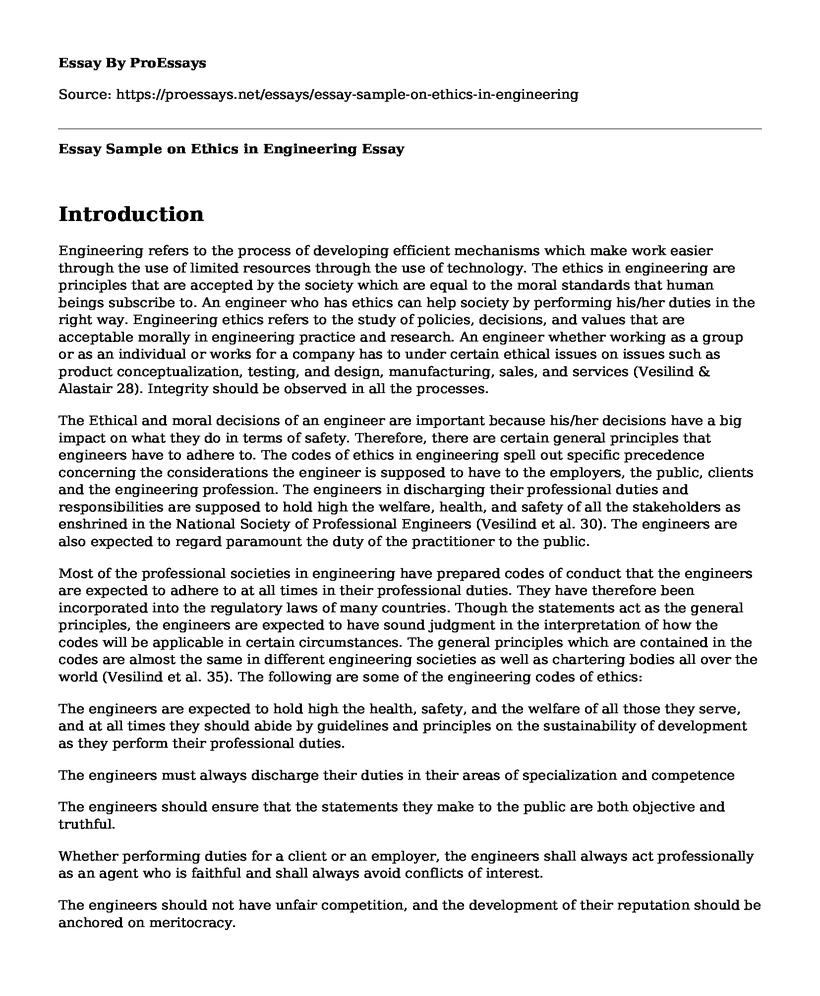Introduction
Engineering refers to the process of developing efficient mechanisms which make work easier through the use of limited resources through the use of technology. The ethics in engineering are principles that are accepted by the society which are equal to the moral standards that human beings subscribe to. An engineer who has ethics can help society by performing his/her duties in the right way. Engineering ethics refers to the study of policies, decisions, and values that are acceptable morally in engineering practice and research. An engineer whether working as a group or as an individual or works for a company has to under certain ethical issues on issues such as product conceptualization, testing, and design, manufacturing, sales, and services (Vesilind & Alastair 28). Integrity should be observed in all the processes.The Ethical and moral decisions of an engineer are important because his/her decisions have a big impact on what they do in terms of safety. Therefore, there are certain general principles that engineers have to adhere to. The codes of ethics in engineering spell out specific precedence concerning the considerations the engineer is supposed to have to the employers, the public, clients and the engineering profession. The engineers in discharging their professional duties and responsibilities are supposed to hold high the welfare, health, and safety of all the stakeholders as enshrined in the National Society of Professional Engineers (Vesilind et al. 30). The engineers are also expected to regard paramount the duty of the practitioner to the public.
Most of the professional societies in engineering have prepared codes of conduct that the engineers are expected to adhere to at all times in their professional duties. They have therefore been incorporated into the regulatory laws of many countries. Though the statements act as the general principles, the engineers are expected to have sound judgment in the interpretation of how the codes will be applicable in certain circumstances. The general principles which are contained in the codes are almost the same in different engineering societies as well as chartering bodies all over the world (Vesilind et al. 35). The following are some of the engineering codes of ethics:
The engineers are expected to hold high the health, safety, and the welfare of all those they serve, and at all times they should abide by guidelines and principles on the sustainability of development as they perform their professional duties.
The engineers must always discharge their duties in their areas of specialization and competence
The engineers should ensure that the statements they make to the public are both objective and truthful.
Whether performing duties for a client or an employer, the engineers shall always act professionally as an agent who is faithful and shall always avoid conflicts of interest.
The engineers should not have unfair competition, and the development of their reputation should be anchored on meritocracy.
Engineers at all times in the course of discharging their duties shall enhance and observe professional integrity, honor, and professional integrity. They should also have zero-tolerance to corruption, bribery, and fraud.
The engineers should develop themselves professionally all through their careers and should also give an opportunity to the engineers under their supervision to develop professionally.
The engineers when discharging their professional duties should treat all persons fairly without any prejudice in regard to sex, gender and other differences (Vesilind et al. 37-39).
Conclusion
There are certainly ethical issues that engineers face though they are not contained in the code of ethics. Such issues include being offered gifts, meals, and other privileges which are likely to compromise their work (Vesilind et al. 40). Engineers whether electrical, electronics, mechanical or civil are expected by the society and the regulatory bodies to hold the highest moral and ethical standards because a deviation of that will compromise their work and might lead to devastating consequences.
Work Cited
Vesilind, PA, Alastair S. Gunn, and Alastair S. Gunn. Hold Paramount: The Engineer's Responsibility to Society. Stamford, CT: Cengage Learning, 2011. Print.
Cite this page
Essay Sample on Ethics in Engineering. (2022, Mar 09). Retrieved from https://proessays.net/essays/essay-sample-on-ethics-in-engineering
If you are the original author of this essay and no longer wish to have it published on the ProEssays website, please click below to request its removal:
- Paper Example on General Motors and the Ignition Switch Recalls
- Key Drivers of Oil Price Changes in the Past Paper Example
- Essay Sample on Future of Coal Under Trump
- The Engineering and Construction Career Path: Where to Begin?
- Essay Sample on Gasoline: Demand Inelastic When Supply High/Low
- Essential Skills to Get Ahead in Engineering: Problem-Solving, Creativity, & More! - Essay Sample
- Commodities Storage & Transportation: Biggest Challenges Ahead - Essay Sample







